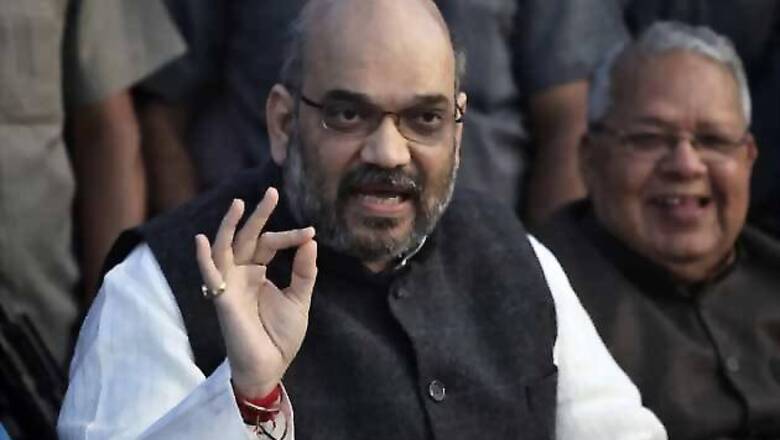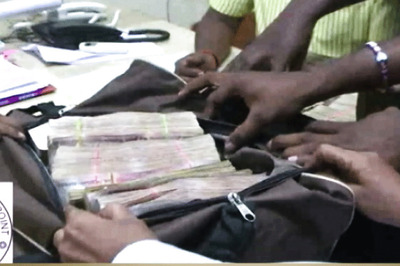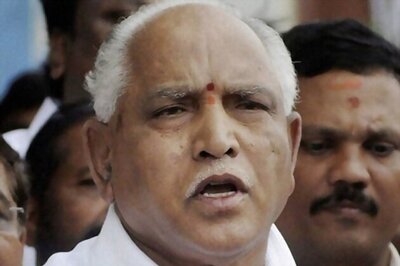
views
Ahmedabad: Amit Shah is charged with three counts of murder. He is also a key election campaign manager and close aide of Narendra Modi, the frontrunner to become India's next prime minister.
To supporters, Shah's proven talent in winning elections makes him the obvious choice to run Modi's campaign in Uttar Pradesh, a swing state that holds the key to national power.
But for critics, Modi's ties to Shah are proof that there is a dark side to the Hindu nationalist leader now storming ahead in opinion polls on promises to sweep away corruption and economic mismanagement.
Modi's popularity stems in large part from his record of governance as chief minister of Gujarat, an economic powerhouse. But he himself is dogged by accusations that he turned a blind eye to sectarian riots in Gujarat, in which at least 1,000 people - mainly Muslims - were killed in 2002. He denies any wrongdoing and the Supreme Court has said there is not enough evidence to proceed against him.
"We were shocked," said Mukul Sinha, a lawyer representing relatives of victims in the cases against Shah, commenting on his appointment as campaign manager for the BJP in Uttar Pradesh, the country's most populous state.
"This man faces criminal charges. But if Modi wins, he could be one of India's most powerful politicians," he said, referring to the possibility that Shah could become a senior federal minister.
An election due by May will pit Modi's BJP against the Nehru-Gandhi dynasty's Congress party, whose popularity has wilted after two terms in power amid a sharp economic slowdown and corruption scandals. The BJP says Congress and other parties pander to minorities for votes. Congress counters that Modi and the BJP are biased, especially against Muslims.
A stocky, bearded figure and son of a well-to-do businessman, Shah was interior minister for seven years in Gujarat before his 2010 arrest and subsequent release on bail.
Shah denies charges that he ordered the killing of a man police claimed was an Islamic militant on a mission to assassinate Modi. The man's wife and a witness were also killed.
Such killings at the hands of police are widespread in India but it is rare for a senior politician to be charged. The BJP says the Central Bureau of Investigation's (CBI) charges were influenced by the Congress-led government, which is often accused of using the federal agency to harass enemies.
"This is a politically-motivated campaign," said BJP spokeswoman Meenakshi Lekhi.
Shah and his lawyers did not respond to requests from Reuters for an interview, but last year he said the case was a political vendetta.
"All of this is being done to defame Chief Minister Modi, me and the BJP," he told a news channel, arguing that similar killings elsewhere in India were not subject to probes.
The case:
Many politicians have criminal charges against them. One study has estimated 30 per cent of lawmakers from all political sides face pending cases, many for serious crimes. One minister of the current government resigned after being convicted of murder.
But Shah's proximity to Modi makes him stand out.
In a chargesheet seen by Reuters, the CBI says while he was interior minister, Shah ran an extortion racket with Gujarat police officers and Sohrabuddin Sheikh, the suspected militant.
They fell out and police snatched Sheikh from a bus with his wife, then staged a gunbattle, the chargesheet said. Sheikh was killed and his wife's cremated body was found in the village of one of the policemen. The witness was killed later.
According to the charges, phone records show Shah had multiple calls with the accused officers during the operation.
Gujarat Police said Sheikh had links with the Pakistan-based militant group Lashkar-e-Toiba, but the state government later told a court that police had staged the gunbattle.
Activists have long tried to link Shah to a separate case of extra-judicial killing involving the same police officers, but the CBI has said there was not enough evidence to charge him in that case.
Riots:
After resigning from the Gujarat state cabinet following his arrest, Shah kept a low profile until being named to lead the Uttar Pradesh campaign. But critics accuse him of adding to religious tensions in the state.
Soon after arriving there last year, Shah visited the site of an ancient mosque razed by Hindu fanatics in 1992, and said a Hindu temple should be built there.
The BJP rose to prominence on the back of a campaign to destroy the Babri mosque, which it says stood on a holy Hindu site. The destruction of the mosque led to nationwide riots that killed nearly 2,000.
Shah last year clarified the dispute over the religious site was not an election campaign issue.
Nevertheless, when Hindu-Muslim violence broke out in Uttar Pradesh shortly after Shah's arrival, the federal government was quick to make the connection, with Minority Affairs Minister Rahman Khan telling a magazine that Shah had been sent expressly to stir up communal tension.
No evidence has been produced to back that charge and villagers in Muzaffarnagar district, where the clashes erupted, say local politicians from several parties fomented the violence in which more than 40 people died. Police have charged two BJP legislators and politicians from other parties with provoking violence via social media and making inflammatory speeches.
A Modi insider blamed other parties for the bloodshed, but added that polarisation along religious lines could consolidate the Hindu vote. "This will naturally help the BJP," he said, declining to be identified.
Coincidence
Indeed, the two BJP legislators charged were garlanded with flowers on stage at a Modi rally in November. The BJP says that they were wrongly detained and Muslims accused of inciting violence were spared.
"It all may be a coincidence," said Uttar Pradesh-based social activist Sandeep Pandey, who visited the strife-torn villages. "But there is certainly an increase in communal tensions. And I have not seen it so bad for years."
Although well educated and more refined than Modi, the son of a tea-seller, Shah has much in common with his mentor.
Both joined the Rashtriya Swayamsevak Sangh (RSS), a voluntary right-wing group that serves as the ideological incubator for Hindu nationalism and as the philosophical parent of the BJP. Shah in particular remains close to the RSS.
Reuters talked to several government officials in Gujarat about Shah. All refused to discuss the charges, but they portrayed him as an intelligent politician with a short temper who is well connected with business leaders and often circumvents civil servants to push through policies. All said he was one of the few politicians trusted by Modi.
"Amit Shah is a misunderstood man. There have been no riots in Gujarat for 12 years," said Lalji Tandon, a BJP lawmaker in Uttar Pradesh. "He's doing a good job in this state at mobilising the grass roots. He's a top organiser, from everything down to the polling booth."



















Comments
0 comment